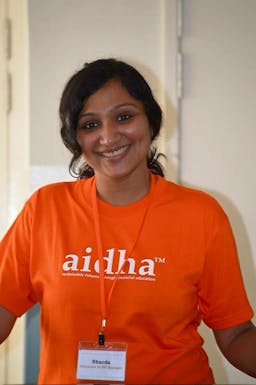Building bridges, enabling empowerment
May 28, 2019
Story
Goal 5 of the 2030 Agenda for Sustainable Development is Gender Equality. While there are different factors that are instrumental in achieving Gender Equality, one of the major challenges and roadblocks that women continue to face is equal access to economic opportunities and financial empowerment. No dialogue on Gender Equality is complete without understanding the importance of Women’s Economic Empowerment.
According to the 2015 UNDP report at least 80% of women in 38 countries don’t have access to bank accounts. Thus, women form a huge part of the world’s total unbanked population. And the reasons are many. Unfair wages and huge gender pay gap, social and cultural norms that relegate women to the domestic sphere, a huge presence of women in the informal and unpaid sector, legal restrictions and sanctions arising out of migration are some of the reasons women have been excluded from accessing different financial services and participating equally in economic activities.
Very often, one associates being unbanked with the lack of financial knowledge or financial literacy skills. While it is important that women have basic money management skills to manage their day-to-day finances and build their savings, it becomes equally key that a financial infrastructure complemented with a range of financial services are put in place to enable women to translate this knowledge into practice. A classic case in point is the story of Kantabai, an ironsmith from a village called Mhaswad in the state of Maharashtra in India. Kantabai wanted to save money by opening a bank account. When she approached the bank, they refused and turned her away. And what could be the possible reason? They felt the deposit amount was too small (less than a dollar i.e. Rs.5-10/ i.e. 7-15 cents in her case) for the bank to be able to maintain her account. But can just meager earnings stop a woman from accessing her right to financial inclusion?
“It is not financial illiteracy but poor solutions for poor that is the challenge when it comes to understanding the problems faced by women like Kantabai,” says Ms. Chetna Gala Sinha, Founder of Mann Deshi Mahila Sahakari Bank, India’s first rural cooperative bank for women, by women. “Often mainstream banks and financial institutions do not take into consideration the varying base of clientele,” observes Ms. Sinha. And this interestingly throws light on the importance of understanding intersectionality even within the domain of finance and women’s economic empowerment. While gender inequality makes it imperative to design different financial services and products for men and women, the glaring socio-cultural and economic differences reinforce the need to have a range of financial services that cater to the different financial needs of the poor and women from the disadvantaged groups.
Activists and social entrepreneurs like Chetna Gala Sinha have long recognized this need. And the several innovative initiatives and programs started by her speak volumes of her struggle to help women like Kantabai to take ownership and control over their financial resources, who never had the institutional means and support to do so. Be it offering functional literacy classes to the women in the village to meet the prerequisite terms for starting the bank or launching a door-to-door banking program to help mitigate the problems arising out of no reliable and affordable transport or embracing technology to develop a biometric smart card ATM access system to facilitate easy cash withdrawals, Ms. Sinha and her team have successfully empowered women through financial inclusion. Further, the lending schemes are designed in line with the businesses operated by the community. For e.g. a lot of women work as street vendors and they need weekly capital to buy products from the market. While the bank gives them cash every week to help them buy the products, the flexible repayment scheme allows them to make daily or weekly repayments depending on how the sales go. Also, to ensure that they do not lose out on their sales and business, the bank officers visit the markets or the place of work to create accounts, disburse loans or collect repayments.
It is beyond words to explain how very simple steps such as understanding one’s community and customizing specific interventions can go a long way in creating a significant impact we are all hopeful of. It’s time we understand that no aspect of gender equality can ignore the intersectional elements. Understanding intersectionality lays the foundation to achieving gender equality- be it social equality, political equality, cultural inclusion or financial inclusion. Every time I read stories of or have conversations with changemakers like Chetna, it instills in me a ray of hope. A hope that makes me feel that economic empowerment of women and financial independence is no longer a dream. Such initiatives go a long way in creating sustainable opportunities for women and help them break the vicious cycle of poverty.
How to Get Involved
There are different ways in which you can help the Mann Deshi Bank and the Mann Deshi Foundation. For more information, you can visit their website: http://www.manndeshibank.com/




